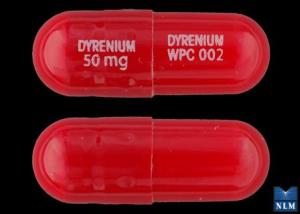Dyrenium Disease Interactions
There are 9 disease interactions with Dyrenium (triamterene).
- Acidosis
- Diabetes
- Electrolytes/fluid
- Hyperkalemia
- Renal dysfunction
- Liver disease
- Nephrolithiasis
- Hyperuricemia
- Folate antagonism
Potassium-sparing diuretics (applies to Dyrenium) acidosis
Major Potential Hazard, High plausibility. Applicable conditions: Diabetes Mellitus, Pulmonary Impairment
Acidosis alters the ratio of extracellular to intracellular potassium and may commonly lead to rapid increases in serum potassium levels. Conversely, high serum potassium concentrations may potentiate acidosis. Because of their hyperkalemic effects, therapy with potassium-sparing diuretics should be avoided in patients with metabolic or respiratory acidosis. These agents should be used cautiously in patients in whom acidosis may occur, such as patients with cardiopulmonary disease, severe respiratory disease, or poorly controlled diabetes. Acid-base balance and serum potassium levels should be monitored at regular intervals.
Potassium-sparing diuretics (applies to Dyrenium) diabetes
Major Potential Hazard, High plausibility. Applicable conditions: Diabetes Mellitus
Potassium-sparing diuretics can cause hyperkalemia, which may result in life-threatening cardiac arrhythmias. Patients with diabetes mellitus, with or without nephropathy, may be particularly susceptible to the hyperkalemic effect of these drugs due to a defect in the renin-angiotensin-aldosterone axis. Therapy with potassium-sparing diuretics should be avoided, if possible, in patients with diabetes, especially uncontrolled or insulin-dependent diabetes mellitus. If these drugs are used, serum potassium levels and renal function should be monitored at regular intervals. Determination of serum electrolytes is especially important during initiation of therapy, after a dosage adjustment, and during illness that could alter renal function.
Potassium-sparing diuretics (applies to Dyrenium) electrolytes/fluid
Major Potential Hazard, High plausibility. Applicable conditions: Electrolyte Abnormalities, Hyponatremia
All diuretics may cause or aggravate fluid and electrolyte disturbances. Potassium-sparing diuretics may cause hyperkalemia and, infrequently, hyponatremia. The latter generally occurs when these agents are combined with other diuretics such as thiazides or used in markedly edematous patients with restricted sodium intake. Therapy with potassium-sparing diuretics should be administered cautiously in patients with or predisposed to electrolyte abnormalities. Electrolyte imbalances should be corrected prior to initiating therapy, and serum electrolyte concentrations should be monitored periodically and maintained at normal ranges during therapy. Determination of serum electrolytes is especially important during initiation of therapy, after a dosage adjustment, and during illness that could alter renal function.
Potassium-sparing diuretics (applies to Dyrenium) hyperkalemia
Major Potential Hazard, High plausibility.
The use of potassium-sparing diuretics is contraindicated in the presence of elevated serum potassium concentrations (> 5.5 mEq/L). Potassium-sparing diuretics can cause hyperkalemia, which may result in life-threatening cardiac arrhythmias. Careful monitoring of serum potassium levels is necessary in all patients treated with potassium-sparing diuretics, especially during initiation of therapy, after dosage adjustment, and during illness that could alter renal function. The diuretic should be withdrawn immediately if hyperkalemia develops, and measures should be initiated to lower serum potassium if it exceeds 6.5 mEq/L. The combined use of a potassium-sparing diuretic with a kaliuretic diuretic (e.g., thiazides) may decrease the risk of hyperkalemia.
Potassium-sparing diuretics (applies to Dyrenium) renal dysfunction
Major Potential Hazard, High plausibility.
The use of potassium-sparing diuretics is contraindicated in patients with anuria, acute or progressive renal insufficiency, or diabetic nephropathy. Potassium-sparing diuretics can cause hyperkalemia, which may result in life-threatening cardiac arrhythmias. Patients with impaired renal function may be particularly susceptible to the hyperkalemic effect of these drugs. Therapy with potassium-sparing diuretics should be administered cautiously in patients with evidence of renal function impairment (BUN > 30 mg/dL or serum creatinine > 1.5 mg/dL). If these drugs are used, serum potassium levels and renal function should be monitored at regular intervals. Determination of serum electrolytes is especially important during initiation of therapy, after a dosage adjustment, and during illness that could alter renal function.
Triamterene (applies to Dyrenium) liver disease
Major Potential Hazard, Moderate plausibility.
Triamterene is contraindicated in patients with severe liver dysfunction.
Triamterene (applies to Dyrenium) nephrolithiasis
Major Potential Hazard, Moderate plausibility.
Triamterene and its metabolites have been reported in renal stones in association with other calculus components. Therapy with triamterene should be administered cautiously in patients with a history of nephrolithiasis.
Potassium-sparing diuretics (applies to Dyrenium) hyperuricemia
Moderate Potential Hazard, Moderate plausibility. Applicable conditions: Gout
Potassium-sparing diuretics have been reported to elevate serum uric acid levels. Therapy with these agents should be administered cautiously in patients with a history of gout.
Triamterene (applies to Dyrenium) folate antagonism
Moderate Potential Hazard, Moderate plausibility. Applicable conditions: Folic Acid/Cyanocobalamin Deficiency, Cirrhosis, Anemia Associated with Folate Deficiency
Triamterene is a weak folate antagonist and may contribute to megaloblastic anemia in cases where folic acid stores have been depleted. Therapy with triamterene should be administered cautiously in patients with or predisposed to megaloblastic anemia, including cirrhotic patients with splenomegaly. These patients should be observed for exacerbations of underlying liver disease during triamterene therapy.
Switch to professional interaction data
Dyrenium drug interactions
There are 359 drug interactions with Dyrenium (triamterene).
Dyrenium alcohol/food interactions
There are 2 alcohol/food interactions with Dyrenium (triamterene).
More about Dyrenium (triamterene)
- Dyrenium consumer information
- Check interactions
- Compare alternatives
- Pricing & coupons
- Reviews (2)
- Drug images
- Side effects
- Dosage information
- During pregnancy
- Generic availability
- Drug class: potassium-sparing diuretics
- Breastfeeding
- En español
Related treatment guides
Drug Interaction Classification
| Highly clinically significant. Avoid combinations; the risk of the interaction outweighs the benefit. | |
| Moderately clinically significant. Usually avoid combinations; use it only under special circumstances. | |
| Minimally clinically significant. Minimize risk; assess risk and consider an alternative drug, take steps to circumvent the interaction risk and/or institute a monitoring plan. | |
| No interaction information available. |
See also:
Further information
Always consult your healthcare provider to ensure the information displayed on this page applies to your personal circumstances.


